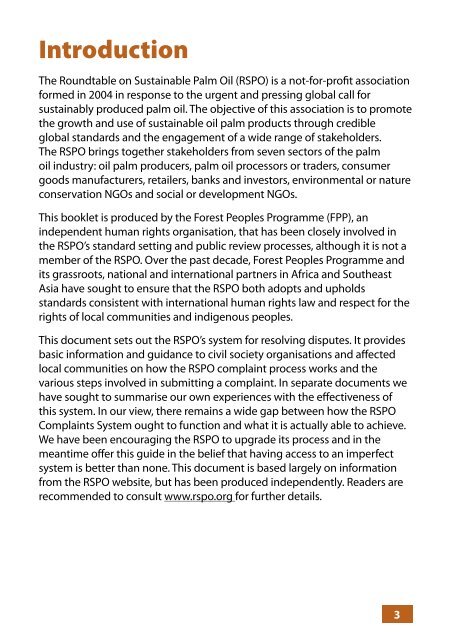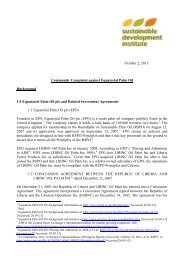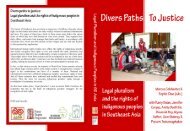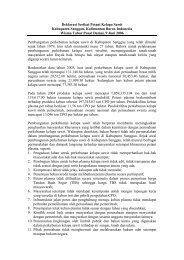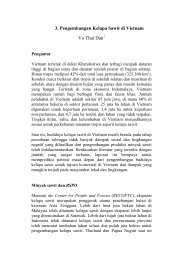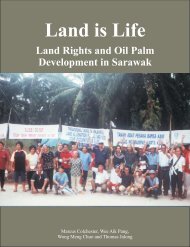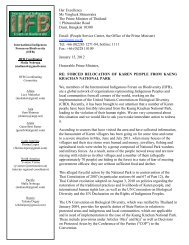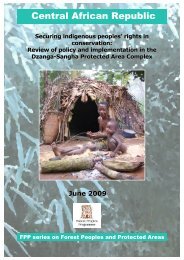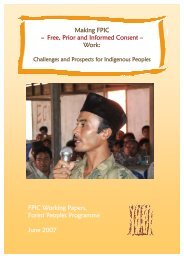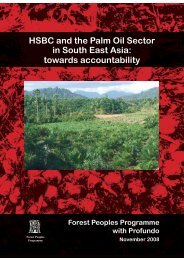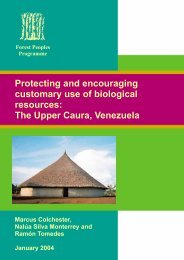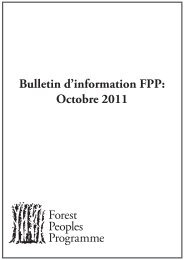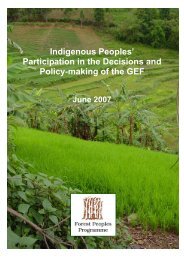(RSPO) and complaint resolution - Forest Peoples Programme
(RSPO) and complaint resolution - Forest Peoples Programme
(RSPO) and complaint resolution - Forest Peoples Programme
You also want an ePaper? Increase the reach of your titles
YUMPU automatically turns print PDFs into web optimized ePapers that Google loves.
IntroductionThe Roundtable on Sustainable Palm Oil (<strong>RSPO</strong>) is a not-for-profit associationformed in 2004 in response to the urgent <strong>and</strong> pressing global call forsustainably produced palm oil. The objective of this association is to promotethe growth <strong>and</strong> use of sustainable oil palm products through credibleglobal st<strong>and</strong>ards <strong>and</strong> the engagement of a wide range of stakeholders.The <strong>RSPO</strong> brings together stakeholders from seven sectors of the palmoil industry: oil palm producers, palm oil processors or traders, consumergoods manufacturers, retailers, banks <strong>and</strong> investors, environmental or natureconservation NGOs <strong>and</strong> social or development NGOs.This booklet is produced by the <strong>Forest</strong> <strong>Peoples</strong> <strong>Programme</strong> (FPP), anindependent human rights organisation, that has been closely involved inthe <strong>RSPO</strong>’s st<strong>and</strong>ard setting <strong>and</strong> public review processes, although it is not amember of the <strong>RSPO</strong>. Over the past decade, <strong>Forest</strong> <strong>Peoples</strong> <strong>Programme</strong> <strong>and</strong>its grassroots, national <strong>and</strong> international partners in Africa <strong>and</strong> SoutheastAsia have sought to ensure that the <strong>RSPO</strong> both adopts <strong>and</strong> upholdsst<strong>and</strong>ards consistent with international human rights law <strong>and</strong> respect for therights of local communities <strong>and</strong> indigenous peoples.This document sets out the <strong>RSPO</strong>’s system for resolving disputes. It providesbasic information <strong>and</strong> guidance to civil society organisations <strong>and</strong> affectedlocal communities on how the <strong>RSPO</strong> <strong>complaint</strong> process works <strong>and</strong> thevarious steps involved in submitting a <strong>complaint</strong>. In separate documents wehave sought to summarise our own experiences with the effectiveness ofthis system. In our view, there remains a wide gap between how the <strong>RSPO</strong>Complaints System ought to function <strong>and</strong> what it is actually able to achieve.We have been encouraging the <strong>RSPO</strong> to upgrade its process <strong>and</strong> in themeantime offer this guide in the belief that having access to an imperfectsystem is better than none. This document is based largely on informationfrom the <strong>RSPO</strong> website, but has been produced independently. Readers arerecommended to consult www.rspo.org for further details.3


